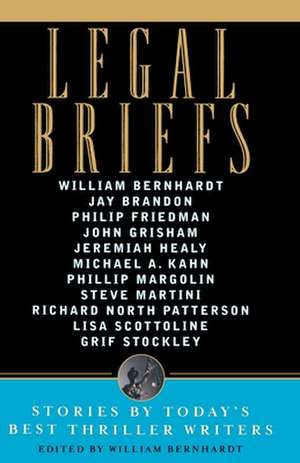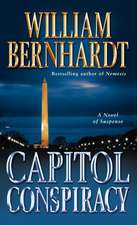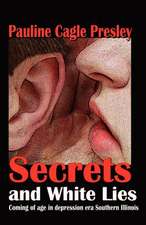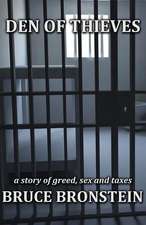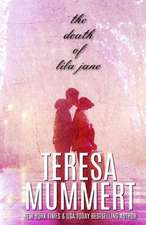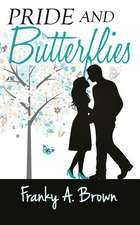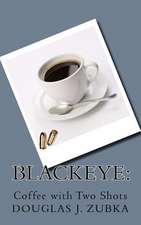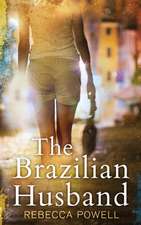Legal Briefs: Short Stories by Today's Best Thriller Writers
Autor William Bernhardten Limba Engleză Paperback – 30 apr 1998
Some of these stories feature twisting and inventive plots; some illuminate the moral dilemmas and psychological complexities faced by the modern-day lawyer; some are good, old-fashioned yarns. But for all their diversity of approaches and characters, these writers understand that the courtrooms and law firms from which they came offer the raw material for the most dramatic, suspenseful stories you can read.
Legal Briefs will be a delight for fans of all these bestselling authors, and a splendid introduction to their talents for readers new to the genre.
Author proceeds from the sale of this book are being donated to the Children's Defense Fund.
From the Hardcover edition.
Preț: 113.87 lei
Nou
Puncte Express: 171
Preț estimativ în valută:
21.79€ • 22.91$ • 18.00£
21.79€ • 22.91$ • 18.00£
Carte disponibilă
Livrare economică 27 martie-10 aprilie
Preluare comenzi: 021 569.72.76
Specificații
ISBN-13: 9780385514439
ISBN-10: 0385514433
Pagini: 304
Dimensiuni: 140 x 216 x 18 mm
Greutate: 0.39 kg
Editura: Knopf Doubleday Publishing Group
ISBN-10: 0385514433
Pagini: 304
Dimensiuni: 140 x 216 x 18 mm
Greutate: 0.39 kg
Editura: Knopf Doubleday Publishing Group
Notă biografică
William Bernhardt is the author of over sixty books, including The Last Chance Lawyer (#1 National Bestseller), the historical novels Challengers of the Dust and Nemesis, two books of poetry, and the Red Sneaker books on writing. In addition, Bernhardt founded the Red Sneaker Writers Center to mentor aspiring authors. The Center hosts an annual conference (WriterCon), small-group seminars, a newsletter, and a bi-weekly podcast. Bernhardt has received the Southern Writers Guild's Gold Medal Award, the Royden B. Davis Distinguished Author Award (University of Pennsylvania) and the H. Louise Cobb Distinguished Author Award (Oklahoma State), which is given "in recognition of an outstanding body of work that has profoundly influenced the way in which we understand ourselves and American society at large." In 2019, he received the Arrell Gibson Lifetime Achievement Award from the Oklahoma Center for the Book.In addition Bernhardt has written plays, a musical (book and score), humor, children stories, biography, and puzzles. He has edited two anthologies (Legal Briefs and Natural Suspect) as fundraisers for The Nature Conservancy and the Children's Legal Defense Fund. In his spare time, he has enjoyed surfing, digging for dinosaurs, trekking through the Himalayas, paragliding, scuba diving, caving, zip-lining over the canopy of the Costa Rican rain forest, and jumping out of an airplane at 10,000 feet. In 2017, when Bernhardt delivered the keynote address at the San Francisco Writers Conference, chairman Michael Larsen noted that in addition to penning novels, Bernhardt can "write a sonnet, play a sonata, plant a garden, try a lawsuit, teach a class, cook a gourmet meal, beat you at Scrabble, and work the New York Times crossword in under five minutes."
Extras
Everyone has a favorite John Grisham book, but among lawyers the preferred novel is almost always A Time to Kill, because of its brutally realistic characters and spellbinding courtroom action. In "The Birthday," Grisham displays his ability to create an equally gripping narrative in only a few pages, as well as his talent for depicting characters who will remain with you long after this short story has ended.
The Birthday
John Grisham
The good doctor awoke in the darkness just before noon. Somehow, through the black-painted windows, a ray of sunshine bounced and reflected and landed in a faint circle on the carpet. He turned away from it, moaning, and rattling the cheap metal frame under the dirty mattress.
His eyes burned but he did not touch them. He opened and closed them, blinking slowly in a hopeless effort to see without hurting. His brain pounded fiercely against his skull--the aftermath of a fifth and a half of six-dollar vodka.
Today was another birthday. The mail would arrive at two. He cursed the vodka, a morning ritual. This was the eighth birthday. She had found him last year in this battered trailer in this armpit mobile-home ghetto where engineless pickups were parked in the streets like statues people were proud of, and where illegitimate toddlers urinated on the curbs, and where televisions shrieked nonstop through ragged storm doors. She had somehow tracked him here. She always knew where to find him.
He took a job selling medical supplies and moved into a duplex where no one could find him. The sixth birthday was on a Sunday, and he was asleep, dreaming, when someone knocked on the door. He just missed her, but she left another envelope with a picture of the birthday boy, now thinner, shriveled, more grotesque. There was no note. He cried over the photo and went for the narcotics. He woke up three days later without a job.
He served ninety days for shoplifting, and borrowed money for the last time from his mother. He found this trailer. He sold some of his pills to buy food.
* * *
He sipped the vodka and read for the hundredth time the newspaper account of a good doctor gone bad. The jury gave Jeffrey four million, and the appellate court affirmed. His ex-wife took what she wanted, and he bankrupted the rest. His malpractice carrier paid its limit of a half a million to little Jeffrey and there was simply no more with the bankruptcy and all. He loved to play tennis, the paper said.
The seventh picture was the worst. Jeffrey's head was much too large for his body, and it was clearly just a matter of time before the birthdays ceased. Last year when he opened the envelope, he sat at the same table and cried over the pictures until he made himself sick and vomited.
Suddenly, he was cold. He pulled the robe tighter around his neck and stuffed his hands deep in the pockets. The folder contained many other things, the divorce papers, letters from lawyers, notices from the state medical board. But he'd read them a thousand times, and the words never changed. He'd looked at the pictures of the little boy a thousand times and prayed hopelessly that the next one would show a healthy kid on a new bike with a big birthday smile. He had grieved over the pictures, gotten drunk over them, moved around like a gypsy because of them, hated them, planned suicide over them. But he wanted to see the next one. Maybe it would be different.
He was drunk now. He drained the plastic cup and threw it on the floor. He collected the photos, wrapped the rubber band back around them, and stood up. His hands were shaking, and he was mumbling to himself when he heard a faint knock on the door. He froze, having no idea what to do. Then, another knock. He held the table for support. A female voice said, "Dr. Green?" She was on the steps.
He made his way to the door and opened it slowly. He peeked around the facing through the storm door. For a moment they studied each other. She seemed to have aged well in the seven years since he had seen her. She was wearing a red dress and a long dark coat. Her eyes were wet. He could hear a car idling not far away. There was nothing in her hands, no envelope, nothing.
"I didn't bring a picture," she said.
He felt himself getting sick. He leaned on the door facing her, but could think of nothing to say. The birthdays were over.
"Jeffrey died two months ago," she said with the resignation of one who was grieving but knew the worst was over. She wiped a tear from her cheek.
"I'm sorry," he said in a voice so weak and shaky that he was inaudible. He tried again, "I'm so sorry."
"Yes, I know," she said. Another tear emerged from her eye and then she actually smiled. She breathed deeply. "I'm tired of hating you, Dr. Green. I've hated you so much for eight years, and now it's over. Jeffrey's gone. He's better off now, and I have the rest of my life to live, don't I?"
He was able to nod slightly. He gripped the doorknob from the inside.
"So, I don't hate you anymore. I'm not going to follow you, and I'm not going to send pictures. And I'm sorry for doing those things." She paused. "I want you to forgive me."
He collapsed and fell to the floor, crying and sobbing pathetically. She knelt on the steps and watched him through the door. He covered his eyes with his hands.
"Please forgive me, Doctor," she said.
"I'm so sorry," he managed to say between hard, loud sobs. "I'm so sorry." He rolled to his side and curled together like a napping child. She stood, watching him. Then she left him there, crying and shaking and groaning to himself.
He awoke on the floor a few hours later. The door was still open, and through it he could hear the sounds of children riding bikes and playing games in the street. He could hear loud TVs through open doors as the heavy housewives had their daily visits with Oprah.
He was too weak and too drunk to stand, so he crawled across the green shag carpet in the den to the dirty tile in the kitchen and back onto the carpet as it led down the hall to the bedroom.
He locked the bedroom door as if someone out there might want to stop him. The pistol was under the mattress. He knew he didn't have the courage to use it, but something forced him closer to it. He felt a strong desire to at least hold the gun in his hands.
From the Hardcover edition.
The Birthday
John Grisham
The good doctor awoke in the darkness just before noon. Somehow, through the black-painted windows, a ray of sunshine bounced and reflected and landed in a faint circle on the carpet. He turned away from it, moaning, and rattling the cheap metal frame under the dirty mattress.
His eyes burned but he did not touch them. He opened and closed them, blinking slowly in a hopeless effort to see without hurting. His brain pounded fiercely against his skull--the aftermath of a fifth and a half of six-dollar vodka.
Today was another birthday. The mail would arrive at two. He cursed the vodka, a morning ritual. This was the eighth birthday. She had found him last year in this battered trailer in this armpit mobile-home ghetto where engineless pickups were parked in the streets like statues people were proud of, and where illegitimate toddlers urinated on the curbs, and where televisions shrieked nonstop through ragged storm doors. She had somehow tracked him here. She always knew where to find him.
He took a job selling medical supplies and moved into a duplex where no one could find him. The sixth birthday was on a Sunday, and he was asleep, dreaming, when someone knocked on the door. He just missed her, but she left another envelope with a picture of the birthday boy, now thinner, shriveled, more grotesque. There was no note. He cried over the photo and went for the narcotics. He woke up three days later without a job.
He served ninety days for shoplifting, and borrowed money for the last time from his mother. He found this trailer. He sold some of his pills to buy food.
* * *
He sipped the vodka and read for the hundredth time the newspaper account of a good doctor gone bad. The jury gave Jeffrey four million, and the appellate court affirmed. His ex-wife took what she wanted, and he bankrupted the rest. His malpractice carrier paid its limit of a half a million to little Jeffrey and there was simply no more with the bankruptcy and all. He loved to play tennis, the paper said.
The seventh picture was the worst. Jeffrey's head was much too large for his body, and it was clearly just a matter of time before the birthdays ceased. Last year when he opened the envelope, he sat at the same table and cried over the pictures until he made himself sick and vomited.
Suddenly, he was cold. He pulled the robe tighter around his neck and stuffed his hands deep in the pockets. The folder contained many other things, the divorce papers, letters from lawyers, notices from the state medical board. But he'd read them a thousand times, and the words never changed. He'd looked at the pictures of the little boy a thousand times and prayed hopelessly that the next one would show a healthy kid on a new bike with a big birthday smile. He had grieved over the pictures, gotten drunk over them, moved around like a gypsy because of them, hated them, planned suicide over them. But he wanted to see the next one. Maybe it would be different.
He was drunk now. He drained the plastic cup and threw it on the floor. He collected the photos, wrapped the rubber band back around them, and stood up. His hands were shaking, and he was mumbling to himself when he heard a faint knock on the door. He froze, having no idea what to do. Then, another knock. He held the table for support. A female voice said, "Dr. Green?" She was on the steps.
He made his way to the door and opened it slowly. He peeked around the facing through the storm door. For a moment they studied each other. She seemed to have aged well in the seven years since he had seen her. She was wearing a red dress and a long dark coat. Her eyes were wet. He could hear a car idling not far away. There was nothing in her hands, no envelope, nothing.
"I didn't bring a picture," she said.
He felt himself getting sick. He leaned on the door facing her, but could think of nothing to say. The birthdays were over.
"Jeffrey died two months ago," she said with the resignation of one who was grieving but knew the worst was over. She wiped a tear from her cheek.
"I'm sorry," he said in a voice so weak and shaky that he was inaudible. He tried again, "I'm so sorry."
"Yes, I know," she said. Another tear emerged from her eye and then she actually smiled. She breathed deeply. "I'm tired of hating you, Dr. Green. I've hated you so much for eight years, and now it's over. Jeffrey's gone. He's better off now, and I have the rest of my life to live, don't I?"
He was able to nod slightly. He gripped the doorknob from the inside.
"So, I don't hate you anymore. I'm not going to follow you, and I'm not going to send pictures. And I'm sorry for doing those things." She paused. "I want you to forgive me."
He collapsed and fell to the floor, crying and sobbing pathetically. She knelt on the steps and watched him through the door. He covered his eyes with his hands.
"Please forgive me, Doctor," she said.
"I'm so sorry," he managed to say between hard, loud sobs. "I'm so sorry." He rolled to his side and curled together like a napping child. She stood, watching him. Then she left him there, crying and shaking and groaning to himself.
He awoke on the floor a few hours later. The door was still open, and through it he could hear the sounds of children riding bikes and playing games in the street. He could hear loud TVs through open doors as the heavy housewives had their daily visits with Oprah.
He was too weak and too drunk to stand, so he crawled across the green shag carpet in the den to the dirty tile in the kitchen and back onto the carpet as it led down the hall to the bedroom.
He locked the bedroom door as if someone out there might want to stop him. The pistol was under the mattress. He knew he didn't have the courage to use it, but something forced him closer to it. He felt a strong desire to at least hold the gun in his hands.
From the Hardcover edition.
Recenzii
From an all-star team of legal thriller writers, eleven stories of top-flight suspense:
"What We're Here For" by William Bernhardt
"Stairwell Justice" by Jay Brandon
"Roads" by Philip Friedman
"The Birthday" by John Grisham
"Voir Dire" by Jeremiah Healy
"Cook County Redemption" by Michael A. Kahn
"The Jailhouse Lawyer" by Phillip Margolin
"Poetic Justice" by Steve Martini
"The Client" by Richard North Patterson
"Carrying Concealed" by Lisa Scottoline
"The Divorce" by Grif Stockley
From the Hardcover edition.
"What We're Here For" by William Bernhardt
"Stairwell Justice" by Jay Brandon
"Roads" by Philip Friedman
"The Birthday" by John Grisham
"Voir Dire" by Jeremiah Healy
"Cook County Redemption" by Michael A. Kahn
"The Jailhouse Lawyer" by Phillip Margolin
"Poetic Justice" by Steve Martini
"The Client" by Richard North Patterson
"Carrying Concealed" by Lisa Scottoline
"The Divorce" by Grif Stockley
From the Hardcover edition.
Descriere
In this anthology, 11 authors--including Richard North Patterson, John Grisham, Steve Martini and Jeremiah Healy--spin tales of capital crimes, moral dilemmas and cold-blooded revenge. There's the story of an Alabama attorney learning about bourbon and genteel blackmail, a tale of medical malpractice and retribution, and a story of jury tampering and the mob.
